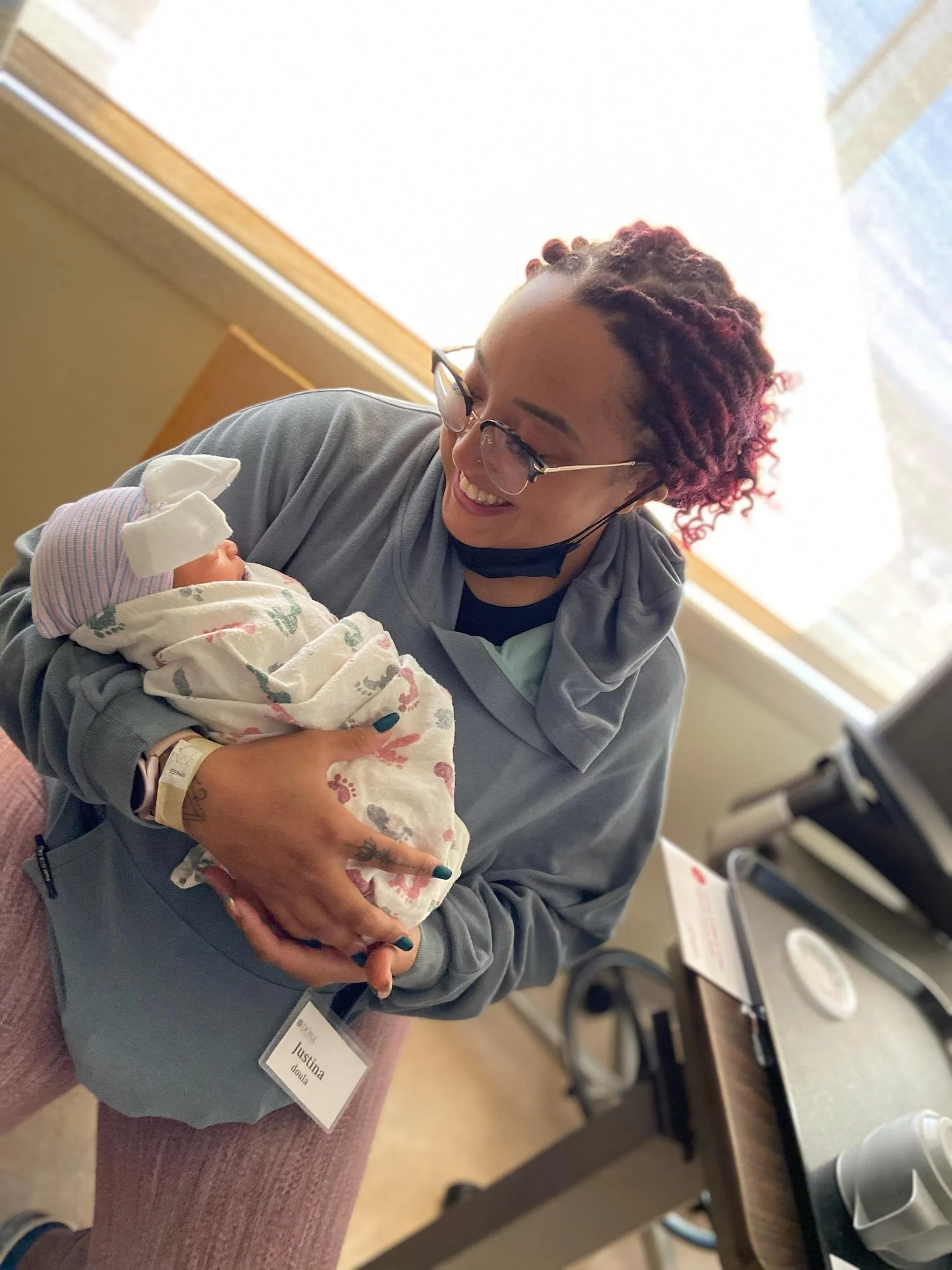-

What is a doula? What is the difference from a midwife?
The main job of the birth doula (or labor doula) is to be by your side offering nonmedical techniques during labor, such as breathing, massage, and helping you move into different body positions.
Doulas also provide emotional support and act as an advocate on your behalf. No matter what type of birth you have, a doula will be there to help you feel safe and empowered. A doula will support you in your decision to use medications or have a “natural” or unmedicated birth.
In the event of an unplanned C-section, a doula can help comfort you and give you extra attention to help alleviate fears and anxieties. As well as help during postpartum as c-section recovery can be a challenge.
Postpartum doulas help a new mother as she recovers from the birthing process. This includes but not limited to caring for the infant and guiding a mother through the breastfeeding process.
A midwife is a trained medical professional that plays a key role during the birthing process.
Certified nurse-midwives can do many of the same things as doctors, including: OBGYNs. They can manage things like hemorrhage and more complications than a labor and delivery nurse.
A credentialed midwife is authorized to work in any setting, including health clinics, hospitals, or the home.
-

Does a doula only support women who have home births?
Absolutely not! A doula will support anyone, no matter the setting of birth. This can be in the hospital, a birth center, or at home. A doula can also support any type of birth, assisted, unassisted, natural, VBAC’s and c-sections, whatever birth you want to have and end up having, a doula will be right by your side.
-

What is the difference between a birth doula and a postpartum doula?
Birth doulas meet with you prenatally, and provide Child Birth Education. Doulas support throughout your labor and birth, and are there for you as you transition into your postpartum chapter. Every doula is different but these are the things that are usually offered in a package: prenatal visits, telephone/email support, on-call availability, continuity of care, assistance and support during labor and birth, assistance with optimal fetal positioning (which can be discussed prenatally and utilized during the birth process), aromatherapy, massage, photography, breastfeeding support, resources and much more.
Postpartum doulas are professionally trained to work with a new mother through the period after birth. The postpartum period, sometimes called the fourth trimester, is the first 6 weeks after the birth of your baby. A birth doula supports you during labor and delivery, but a postpartum doula lends a hand and offers knowledge and support once you bring your baby home.
Postpartum doulas provide the following support, and the type of support is really tailored to the needs of your family:
Offering breastfeeding knowledge, support, and assistance
Helping with newborn care, such as diaper changes, naps, and feedings
Providing resources to related services, such as birthing classes or a lactation consultant
Helping your family learn and become comfortable with baby soothing and bonding methods
Caring for the baby so parents can take a nap, shower, or eat a meal
Helping with mom's post-birth comfort measures
Offering physical support as mom recovers from a cesarean delivery
Making breakfast, lunch, dinner, or healthy snacks
Keeping mom hydrated and comfortable
Playing with older children and helping with bedtime and naptime
Taking care of light household cleaning, such as dishes, tidying up, and laundry.
The Just Birth(ed) package provides both services.
-

When is the best time to hire a doula?
Typically, the earlier the better. In my experience as a doula, hiring a doula after the first trimester is an ideal time. This gives you and your doula enough time to get to know each other and to be able to facilitate all of your prenatal appts. You definitely should have your doula secured by the third trimester to ensure you have enough time to get to know your doula, develop your birth plan along with several other tasks you and your doula will complete together.
If you consider yourself a planner or someone who experiences anxiety more often, hiring a doula earlier in your pregnancy might be helpful to you. This allows you to really form that trusting relationship and feel unconditionally supported as you navigate the emotional and mental ups and downs of pregnancy.
-

Does a doula replace my partner?
No, absolutely not. As a doula, our role is to amplify support. A doula’s role supports you, and that goes for your partner too. “Your partner knows you better than anyone else. Even if they aren't sure how to support you in labor/birth, they know your fears, preferences and desires. We work with your partner by encouraging them, offering guidance and suggestions when needed, reminding them to also stay hydrated and to take bathroom breaks, and more. If your partner has witnessed birth before, they still deserve support and the comfort in knowing they are supported as well.”
Sometimes just reminding your partner that their doula is there for support and if they need to rest, use the restroom or even get something to eat, that they can and their partner will appreciate it.
Photo taken by Hana Rogonich
-

What if I have a C-section (cesarean birth), is a doula useful then?
A doula can be very helpful during a c-section, especially if it is an emergency c-section and catches you and your partner by surprise. Your doula can help decrease the anxiety around having a cesarean. A doula will also create a birth plan for you surrounding a c-section so that you can still make decisions surrounding your birth.
A doula can bring in another set of hands and eyes and ears to help you better prepare for your upcoming surgical birth. She can help you get answers to your questions and formulate a birth plan for a cesarean section.
During the period before surgery, your doula can help explain procedures to you and help you get answers to any questions that you have, much like she would during a normal labor setting. Your doula can help you manage painful procedures like the administration of an IV or even the spinal or an epidural for your surgery.
“Once inside the operating room (OR), your doula will assist you in knowing what is going on by giving you details of whatever you wish to know. Your surgeon and assistants are busy doing the surgery. The nurses are preparing the room for the baby. Your husband or partner is awaiting the baby and, if immediate skin-to-skin contact is not available, may soon go to the warmer to greet the baby. Your doula will be at your side. She can take photos if you desire, particularly after the baby is born. She can remind the staff of any special requests you may have, like letting your husband announce the sex of the baby or to keep a quiet room during the birth.” (verywellfamily.com)


